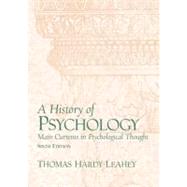
Note: Supplemental materials are not guaranteed with Rental or Used book purchases.
Purchase Benefits
What is included with this book?
| Background to Psychology | |
| Science, History, and Psychology | |
| Origin of Politics, Philosophy, Science, and Psychology: The Classical World | |
| Spirituality and Individualism: The Middle Ages and Renaissance | |
| The Scientific Revolution and Creation of Consciousness: The Seventeenth Century | |
| Enlightenment and the Science of Human Nature: The Eighteenth Century | |
| To the Threshold of Psychology: The Nineteenth Century | |
| Founding Psychology | |
| The Psychology of Consciousness | |
| The Psychology of the Unconscious: Sigmund Freud and Psychoanalysis | |
| The Psychology of Adaptation | |
| Psychology in Modernity | |
| The Conspiracy of Naturalism | |
| Behaviorism | |
| Cognitive Science | |
| The Rise of Applied Psychology | |
| The Psychological Society | |
| Table of Contents provided by Publisher. All Rights Reserved. |
The New copy of this book will include any supplemental materials advertised. Please check the title of the book to determine if it should include any access cards, study guides, lab manuals, CDs, etc.
The Used, Rental and eBook copies of this book are not guaranteed to include any supplemental materials. Typically, only the book itself is included. This is true even if the title states it includes any access cards, study guides, lab manuals, CDs, etc.